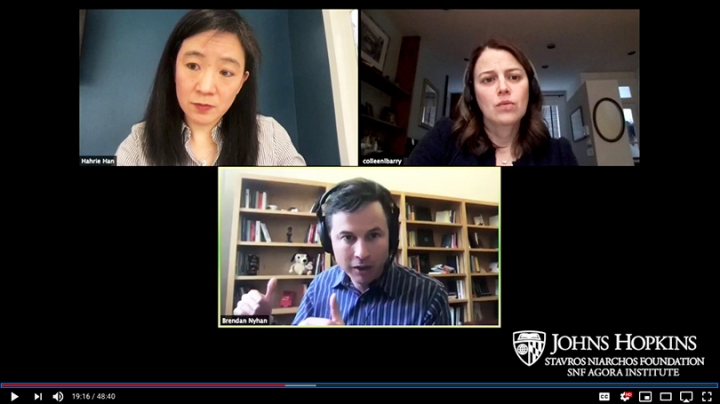After hand washing and social distancing, the most effective way people can fight the COVID-19 pandemic is to be a positive voice for accurate information in their social network, says Professor of Government Brendan Nyhan, whose work focuses on misconceptions about politics and health care, particularly in the context of social media.
“You are a credible, respected source in your social network, and you can do a lot in that context, whether that’s offline or online,” Nyhan says. “There is a lot of local rumor and misinformation that you might be able to help deal with, or at least limit its spread.”
Nyhan was speaking on “SNF Agora Conversations: The Politics and Policy of COVID-19,” a weekly public webinar hosted by SNF Agora Institute at Johns Hopkins University, an academic-public forum dedicated to strengthening democracy.
As a guest on the inaugural episode of the webinar, Nyhan joined host Hahrie Han, a professor of political science and director of the SNF Agora Institute at Johns Hopkins University, and co-panelist Colleen Barry, chair of the department of health policy and management at the Johns Hopkins Bloomberg School of Public Health, to discuss communication, misinformation, social media, and the promotion of public health during the COVID-19 crisis.
The webinar is featured on Johns Hopkins’ Coronavirus Resource Center website, a definitive resource for tracking the worldwide spread of the coronavirus and a platform for health and policy professionals to exchange information and ideas.
The panelists agreed that the spread of the disease and the responses of governments and institutions are all happening so quickly that public perceptions are still forming and have not yet been incorporated into a political-identity framework. As an example of the politicization of perceptions, Barry pointed to climate change, an issue about which opinions are often linked to people’s self-identification on the left or right of the political spectrum.
But the beginnings of politicization are apparent, the panelists agreed, and it is essential that accurate information is disseminated as quickly as possible by as many people as possible. Nyhan noted that his research has shown that telling people what’s not true may not be the best way to approach false claims about emerging diseases.
“My co-authors and I studied misinformation about the Zika virus when it was circulating in Brazil,” Nyhan said. “When we gave people corrective information there, it had no effect on their beliefs about the disease, but it made them question some of their other beliefs and seemed to make them more uncertain about what they knew.”
So it is essential to emphasize the factual information that we do know, and not try to confront incorrect or misleading information, he said.
“We can play whack-a-mole all day with the various myths out there, but we need to be reinforcing over and over again these important messages about washing your hands, and social distancing, and all the other things that are going to help us get through this epidemic.”
The best way to stay informed about the pandemic, Nyhan and the others said, is to visit the websites of the Centers for Disease Control and Prevention, the World Health Organization, and state health officials in your location. For those looking for more detailed information, Nyhan recommends “Public Health on Call,” a podcast from the Bloomberg School of Public Health, and “This Week in Virology,” or TWiV, a podcast produced by the Microbe TV, an open-access podcast network on the sciences.
“Getting away from political and sports reporters who got thrown on this story, getting away from what you heard from a friend of a friend, getting away from the TV doctors, and getting closer to the real subject-matter experts is critical. If you want to drill down, those are the people you want to be learning from,” Nyhan said.
And finally, Nyhan urged listeners to do their part to deal with the social isolation that the crisis is going to create for the most vulnerable.
“Maintaining those connections is important,” Nyhan said. “My parents are at home right now and I’m calling them every day because I’m worried that they don’t have any contact with the outside world. I think that’s something that we all can do to try to make this experience a little more bearable.”
For the latest information on Dartmouth’s response to the pandemic visit the COVID-19 website.
William Platt can be reached at william.c.platt@dartmouth.edu.

